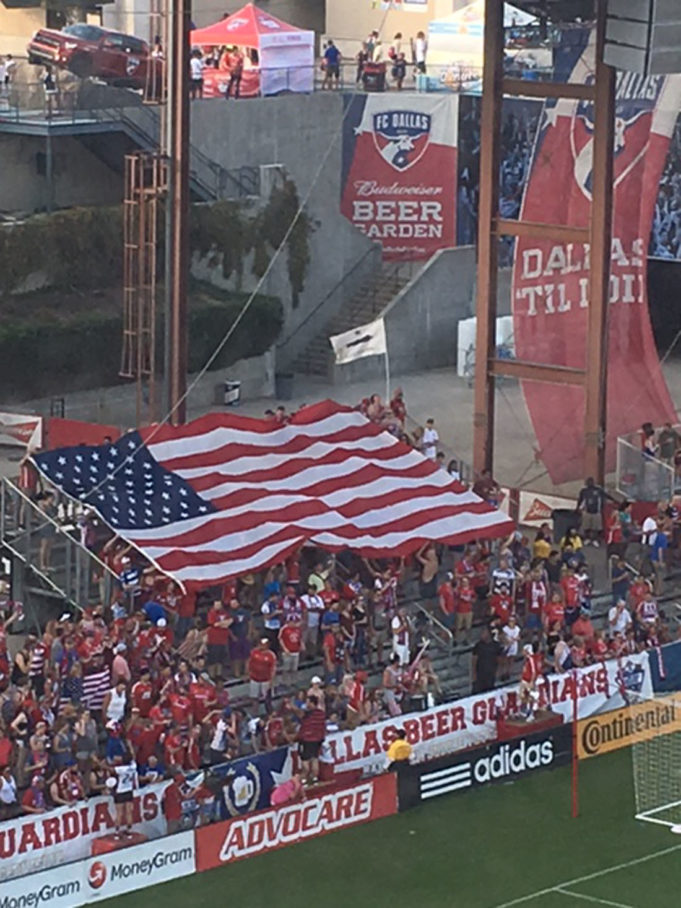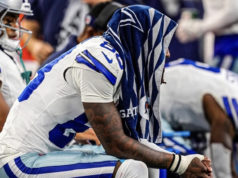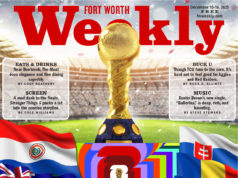It’s July 4th. I’m an Englishman in North Texas. I’m torn — more in a Natalie Imbruglia circa 1997 kinda way than a perineum-in-need-of-stitches one. What to do? Soccer. That seems like an elegant compromise. All the pomp and patriotism of the national holiday but with the blankie of soccer to soothe the 241-year wound. (To be honest, nobody in England could give a shit. The whole sorry episode is churlishly covered in minimal detail in high school history classes across the pond.)
No shade. No. Shade. Zero. Zip. Nada. 93 degrees, RealFeel 101, about to watch soccer, in Frisco. I walk signlessly around FC Dallas’ Toyota Stadium a couple times trying to find the right place to pick up my tickets. I play soccer at least once a week in this late-day swelter, but somehow it’s way more discomfiting to stroll round with moderate intensity looking for tickets to watch soccer than it is to play it.
The atmosphere in and around the stadium was relaxed and festive as fans enjoyed the warm surety of the North Texas summer. Drummers drummed; a DJ scratched; copious amounts of stuff was offered and taken; hell, people smiled and took time for one another. For context, soccer in Europe takes place through the winter months, causing fans to huddle indoors pre-game, scurrying at the last through the inevitable cold air and invariably incessant rain. As such, there’s no time for drumming drummers, scratching DJs, or regarding one’s fellow human beings unless it be with a scowl should their presence cause the merest delay, extending the time spent getting colder and wetter en route to the stadium.
The U.S. national anthem is, to an incomer, as bafflingly complex and difficult to fathom in its range and self-assured hyperbole as are the people of this fair land. However, said theme for a nation is never knowingly under-sung. (It’s not, by any stretch, delivered with the raw gusto of a line of 15 professional French rugby players, arm in arm, tugging ferociously at each other’s hulking jersey shoulders as they heave and roar, in tears, to the utterly sublime, violent poetry of “La Marseillaise.”)
People who disparage soccer as “22 people kicking a bag of wind” (my poor, misguided brother among them) miss the point as badly as Diana Ross missed the goal two yards in front of her during the launch of the 1994 World Cup at Chicago’s Soldier Field. Soccer is about belonging. At the base level, it is tribal — us versus them. On the same level, it is about belonging to a tribe. This is what brings out fans in rain, wind, and relentless cold weather through the winter months across Europe. That same primal urge to belong brings together fans through the Texas summer to risk heatstroke and third-degree sunburns.
With the game underway, all the key elements for being a fully entertained spectator of U.S. stadium sports are well executed: pyrotechnics after each goal; t-shirt cannons at the half; rousing celebratory music; easy-to-follow action on big screens with the opulence of instant replays enabling fans to bask, from several camera angles, in the goal they inevitably missed as they turned to their soccer copain to bemoan the lack of action these past few minutes. (Or is that just me?) Let me be abundantly clear, the billionaire playthings that are the always sold-out stadia of the English Premier League are the unkempt great-uncle of their U.S. relations — mostly careworn around the edges, they have epic tales of pathos and occasional glory but have long since ceased to be comfortable to be around for any length of time. You visit because that’s what you’ve always done, and each time you hope he’s having a good day despite the odd smell and the always cold, unnecessarily bare walls.
Back in Frisco, some soccer happened. The FC Dallas roster is a glorious international mélange, from a hometown boy keeping goal (Jesse Gonzalez) to the two-goal game winner from Africa’s west coast (Roland Lamah). Points between include the Caribbean, much of Central and South America, and many of the United States. My eyes were oft drawn to former player-turned-head coach Oscar “Papi” Pareja. His incessant twists and twitches betraying a now-faded level of skill and undimmed vision of soccer that surely make it torture for him to be sidelined at the “I can still do that” age of 48.
Dallas ran out winners, 4-2. It was all much less athletic and slower than I’m used to witnessing up close. Each pass received offering so much time on the ball — I’ve had less touches on a third date. Give me back 10 years, and I’m convinced I could slot straight into the starting XI over at Toyota Stadium, seriously. Though that could be the heatstroke talking.
Comments, tips, questions, and suggestions — and self-pleasuring directives — can be sent to truman@fwweekly.com.












